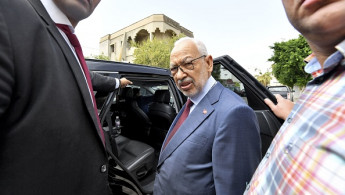Tunisia's Ennahda Party slams judiciary for Ghannouchi detention, says amounts to 'torture'
Tunisia's Ennahda Movement has accused the country's counter-terrorism prosecutor of torture and abuse after the party leader was detained for hours earlier this week.
Rached Ghannouchi was kept in custody for interrogation for more than 14 hours, according to Ennahda, for what it called "fabricated cases and malicious" terrorism charges.
It said what was happening to Ghannouchi - the country’s former parliament speaker and senior Ennahda official - was a "flagrant violation of human rights and an insult to dignity", holding the judicial authority "fully responsible for the repercussions of what is happening".
Tunisia has witnessed a crackdown on opposition forces since a power grab - described as a "coup" by many - by President Kais Saied in 2021.
Lawyer Enas Al-Harrath told the Arabi21 website that what happened to Ghannouchi is illegal, and is an example of torture and violation of his human rights.
Riad Al-Shuaibi, one of Ghannouchi's advisors, said the government was harassing the party and its members to silence opposition.
"Although nothing can be ruled out under this government, Ennahda remains the largest party in the country, and it has a large popular base, and it represents a guarantee for the continuation of the democratic path," Al-Shuaibi also told Arabi21.
Tunisian police had summoned Ghannouchi and former prime minister Ali Laarayedh, also a member of Ennahda, to be interrogated on Monday as part of an investigation into "sending jihadists to Syria and Iraq".
Ennahdha categorically denies the claims.
In July, Ghannouchi called Tunisian President Kais Saied "the face of the counter-revolution" in an interview with The New Arab's sister site, Al-Araby Al-Jadeed.
Tunisia's referendum is an unpopular mandate to reverse democracy.@AlessandraBajec explains why https://t.co/RLaWqz3JhX
— The New Arab (@The_NewArab) July 27, 2022
Saied sacked the prime minister and dissolved parliament - where Ennahda held the largest number of seats - in a power grab last year, and has taken further steps to monopolise power in the country.
In July, Tunisia passed a controversial constitution that gives Saied unchecked powers.
The North African country is in a dire economic situation, with the price of fuel and other essential goods continuing to increase. Recently food shortages have added to the economic woes.
Tunisia was seen as the "success story" of the 2010-11 Arab Spring movement until Kais Saied's power grab.





 Follow the Middle East's top stories in English at The New Arab on Google News
Follow the Middle East's top stories in English at The New Arab on Google News


